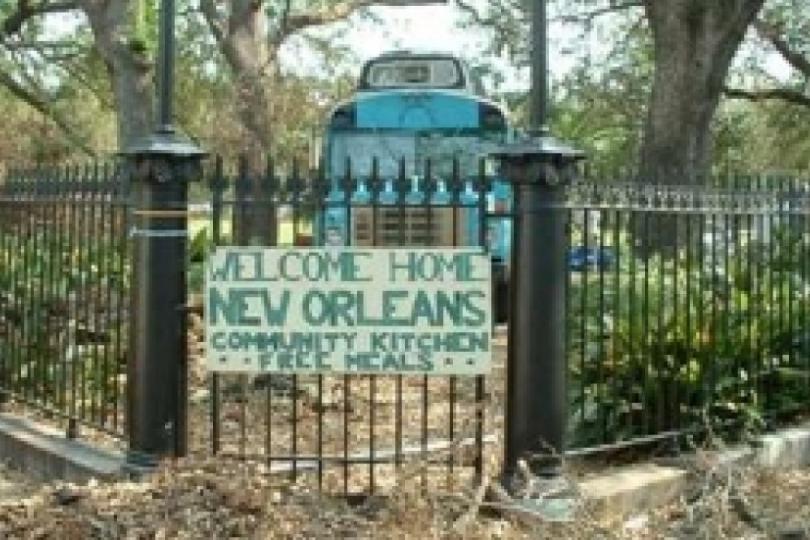What gives you the right?
Editorial

Saturday night I attended The Bindery Projects’ presentation of Notes on the Emptying of a City, a “live documentary performance” by artist and activist Ashley Hunt on the aftermath of Hurricane Katrina. It was an interesting piece of theater, a multimedia mix of video clips and still images strung together by Hunt’s eloquent, first-person account of the institutionalized chaos and injustice of post-Katrina New Orleans.
The real show didn’t kick off, though, until the post-performance Q&A, when several audience members questioned Hunt’s authorial voice. By running the events of Katrina through the filters of his artistic sensibilities and personal experiences, they argued, he diminished the horrific reality by making it all about himself. Other attendees leapt to Hunt’s defense, while still others noted that we were all being part of the problem by debating semantics rather than going out and actually doing something. In other words, it was pretty much exactly why a lot of people don’t go see nonfiction activist performance pieces in warehouse art galleries (and exactly why certain other people do).
I originally intended to write a reaction to Hunt’s piece, but now I’m much more interested in writing a reaction to the reaction. I could see why people felt Hunt’s presence in the story trivialized his subject matter, mainly because I’ve been worrying about exactly that for years. Just before the discussion became heated, I’d been fretting about whether to ask a question myself. The problem was that I felt I’d have to preface any question by announcing that I’d lived in New Orleans before Katrina and had, much like Hunt, caught the first available transport into the city after the storm to document the damage and speak to survivors. I worried that explaining all that would put the focus on me instead of Notes on the Emptying of a City and its very real story. Worse yet, I thought presenting the room with my bona fides might come off as me providing credentials on why I was qualified to have an opinion on the matter, artistic or otherwise. With those concerns buzzing around my brain, I was taken aback to hear the room demand exactly those credentials from Hunt while chiding him for imposing his own viewpoint on his art.
I was all the more dismayed because I knew where they were coming from. After my own post-hurricane fact-finding trip, I returned to my creative writing classes in Chicago feeling a responsibility – to myself and to New Orleans – to write as much about Katrina as I possibly could. For more than a year afterward very few documents came sliding out of my printer that weren’t New Orleans-themed. Crass as it may sound, Katrina turned out to be a great boon to my writing. I won awards, I was invited to showcases and I landed in publications that likely never would have considered me if I’d been writing on any other topic. With that success came guilt. Was I just exploiting the devastation I’d witnessed for my own advancement? Was I cheapening the many lost lives by using them as a backdrop for my Faulkner imitations and self-indulgent reflections?
At the same time, I found myself becoming fiercely protective of New Orleans and, perversely, of Katrina. I bristled when a classmate wrote a story about a couple riding a boat through flooded Mid-city buildings. What gave her the right? She hadn’t lived there. She hadn’t smelled the rancid odor of the newly receded floodwaters hanging in the air. She hadn’t looked into the haunted eyes of survivors as they haltingly related the stories of the worst nights of their lives. I had done all that. New Orleans was my city. The hurricane was my story to tell. If you didn’t truly know what it means to miss New Orleans, you had no right to talk about it.
The more distance I got from the situation, though, the more ludicrous that thinking appeared to me. After all, I was just a northern guy who’d lived in New Orleans for two years and spent a week sleeping on my friends’ couch after the storm. What claim did that give me on anything? I loved the city, but it wasn’t the only existence I’d ever known. I hadn’t been inside the Super Dome when the roof peeled away. I hadn’t sifted through Ninth Ward rubble in search of survivors. Looking at the larger picture, I had no more right to be writing about Katrina than anyone else did. That made me feel ashamed for a while, until I realized I also had no less right than anyone else did.
The idea that artistic inspiration is some sort of meritocracy is absurd. Of course Ashley Hunt has the right to tell the story of New Orleans dealing with disaster. So do Katrina survivors, Midwestern grad students and David Simon. If you’re telling the story in a way that captures an audience’s attention, it will be embraced. If you’re not, it won’t. If you’re offering an artistic interpretation of real-life events, the audience will be your fact checker. If you get the facts wrong (and the audience decides that those particular facts matter), you’ll be booed off the stage, maybe literally. The audience doesn’t get to decide who is allowed to tell which story, but they do get to decide which stories they listen to. That’s where the meritocracy comes in. There are absolutely some artists whose knowledge, experience and skill sets allow them to address certain topics more effectively, but suggesting that other artists shouldn’t even try goes against the very spirit of art.
As for the artist making the work about him or herself, what other option is there? How is it even possible for an artist to address a topic without filtering it through his or her own experience and adapting it to his or her chosen medium and vernacular? That’s what art is, for heaven’s sake! Strip the personal expression away and you’re left with journalism (and I’d argue that even that is a form of art, but that’s another conversation). As one commenter at the Q&A put it, sometimes the facts aren’t enough. Sometimes getting an audience to connect with a truth requires an extra filter of individual humanity. Yes, that filter can be more problematic when you’re dealing with real-life events, especially tragic ones, but that doesn’t invalidate anything or anyone. Again, if the filter looms large enough to distract from the artistry, the audience will disappear pretty quickly.
As a writer, I enter virtually every situation, from making my morning coffee to witnessing the birth of my child, with the same thought in the back of my head: Can I write something about this, and if so, how? I believe most artists would say something similar. So of course Ashley Hunt’s theatrical interpretation of post-Katrina New Orleans is about Ashley Hunt. There’s no other way it could be. And that’s OK. And this essay about Ashley Hunt’s performance being about Ashley Hunt is about me. I have no doubt that some of the other people at the Bindery on Saturday night would have a radically different interpretation of that Q&A session. And that’s OK too. Because it’s all art, and we don’t get to choose who makes it or how they do it. We just get to decide what we think about the finished product.
And that’s a beautiful concept, goddammit.




